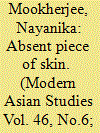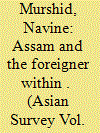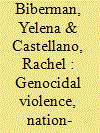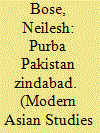| Srl | Item |
| 1 |
ID:
115287


|
|
|
|
|
| Publication |
2012.
|
| Summary/Abstract |
This paper addresses how the wombs of women and the absent skin on the circumcised penises of men become the predominant sites on which racialized and gendered discourses operating during the Bangladesh War are inscribed. This is explored by examining instances of sexual violence by Pakistani soldiers and their local Bengali collaborators. The prevalence of these discourses in colonial documents about the Bengali Muslims underscores the role of history, the politics of identity and in the process, establishes its link with the rapes of Bangladeshi women and men. Through this, the relationship between sexual violence and historical contexts is highlighted. I locate the accounts of male violations by the West Pakistani army within the historical and colonial discourses relating to the construction of the Bengali Muslim and its intertextual, contemporary citational references in photographs and interviews.
I draw on Judith Butler's and Marilyn Strathern's work on gendering and performativity to address the citational role of various practices of discourses of gender and race within colonial documents and its application in a newer context of colonization and sexual violence of women and men during wars. The role of photographs and image-making is intrinsic to these practices. The open semiotic of the photographs allows an exploration of the territorial identities within these images and leads to traces of the silence relating to male violations. Through an examination of the silence surrounding male sexual violence vis-à-vis the emphasis on the rape of women in independent Bangladesh, it is argued that these racialized and gendered discourses are intricately associated to the link between sexuality and the state in relation to masculinity.
|
|
|
|
|
|
|
|
|
|
|
|
|
|
|
|
| 2 |
ID:
145689


|
|
|
|
|
| Summary/Abstract |
A popular narrative in India targets Bengali Muslims as “foreign encroachers” in Assam, claiming that they are in fact Bangladeshi migrants. An examination of the history of this narrative and an analysis of demographic data reveal that the available evidence does not support the illegal-infiltrator narrative.
|
|
|
|
|
|
|
|
|
|
|
|
|
|
|
|
| 3 |
ID:
160691


|
|
|
|
|
| Summary/Abstract |
Why did the Pakistani military carry out genocidal violence against East Pakistani Hindus during the 1971 civil war when the Hindus did not constitute a security threat? This question carries not only theoretical but also important policy and security implications in present-day Bangladesh. A uniquely in-depth analysis of the little-known genocide in East Pakistan in 1971 shows that genocidal violence may be used as an instrument of nation-building. It was designed to mobilize both the Pakistani troops and the Bengali Muslim population against a convenient, well-defined enemy. The logic of othering – and then exterminating – a religious minority was meant to integrate a defiant, and previously marginalized, group into a reimagined community.
|
|
|
|
|
|
|
|
|
|
|
|
|
|
|
|
| 4 |
ID:
131770


|
|
|
|
|
| Publication |
2014.
|
| Summary/Abstract |
This paper details the history of the concept of Pakistan as debated by Bengali intellectuals and literary critics from 1940-1947. Historians of late colonial South Asia and analysts of Pakistan have focused on the Punjab along with colonial Indian 'Muslim minority' provinces and their spokesmen like Muhammed Ali Jinnah, to the exclusion of the cultural and intellectual aspects of Bengali conceptions of the Pakistan idea. When Bengal has come into focus, the spotlight has centred on politicians like Fazlul Huq or Hassan Shahid Suhrawardy. This paper aims to provide a corrective to this lacuna by analyzing Bengali Muslim conceptualizations of the idea of Pakistan. Bengali Muslim thinkers, such as Abul Mansur Ahmed, Abul Kalam Shamsuddin, and Farrukh Ahmed, blended concepts of Pakistan inside locally grounded histories of the Bengali language and literature and worked within disciplines of geography and political economy. Many Bengali Muslim writers from 1940 to 1947 creatively integrated concepts of Pakistan in poetry, updating an older Bengali literary tradition begun in earlier generations. Through a discussion of the social history of its emergence along with the role of geography, political thought, and poetry, this paper discusses the significance of 'Pak-Bangla' cultural nationalism within late colonial South Asian history.
|
|
|
|
|
|
|
|
|
|
|
|
|
|
|
|